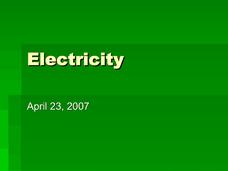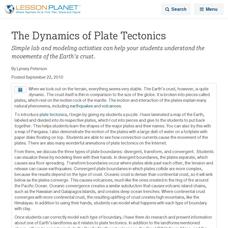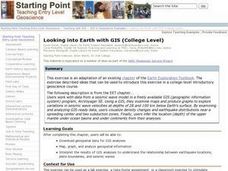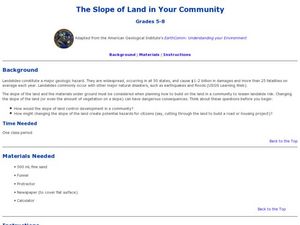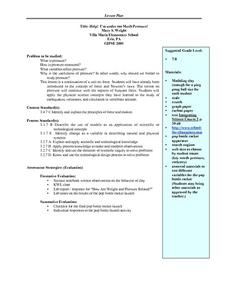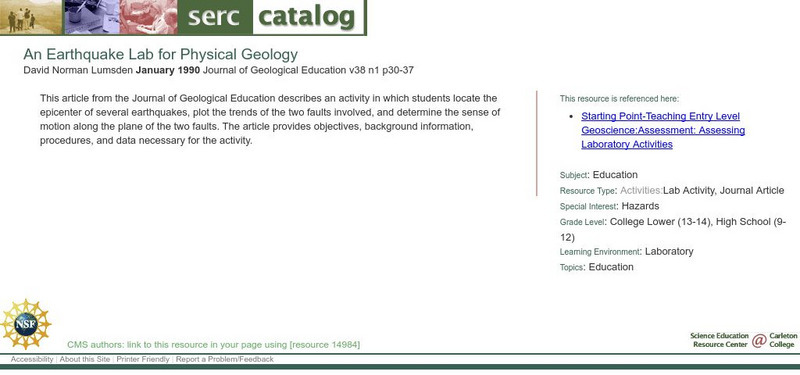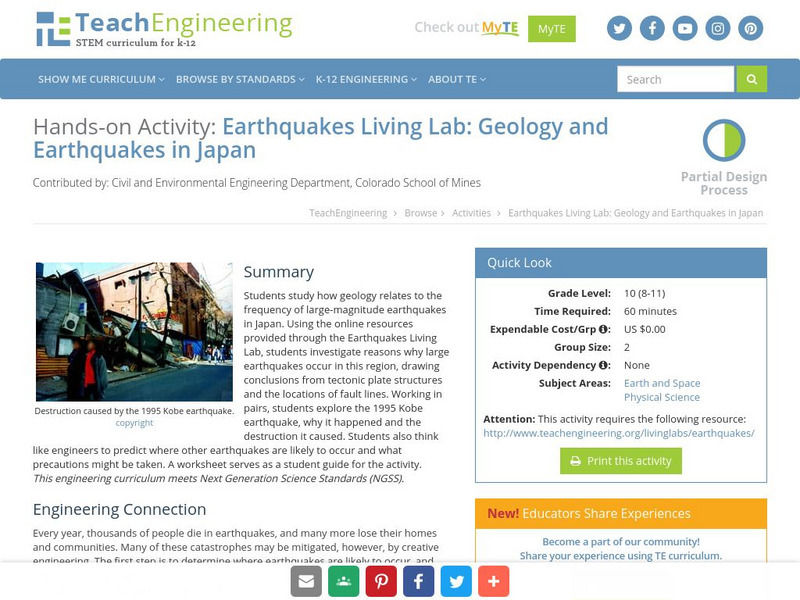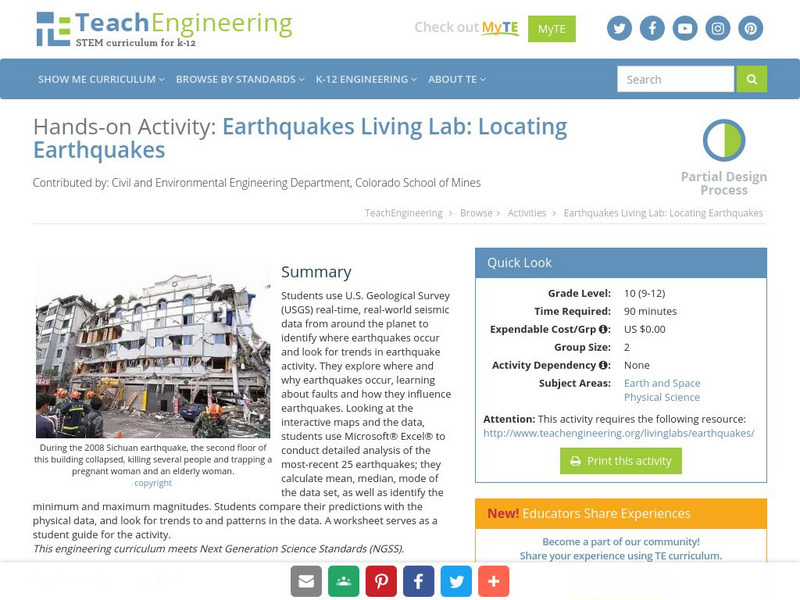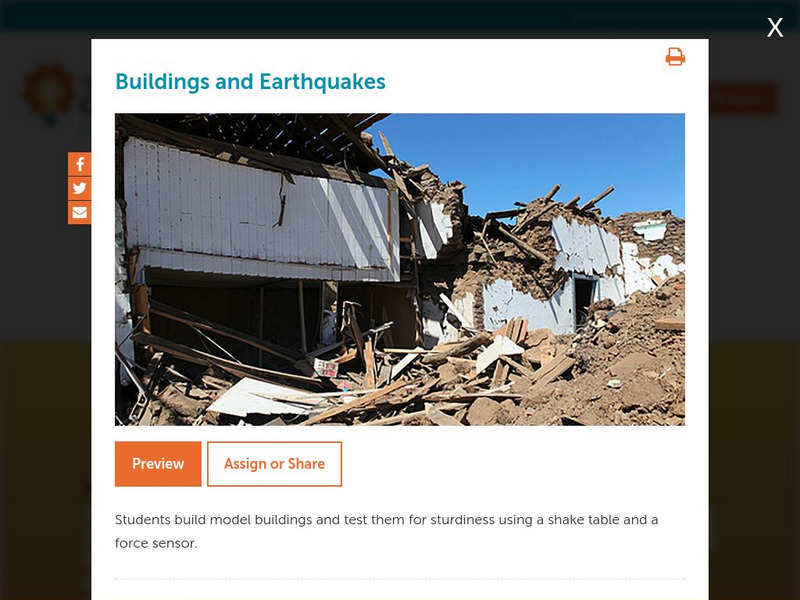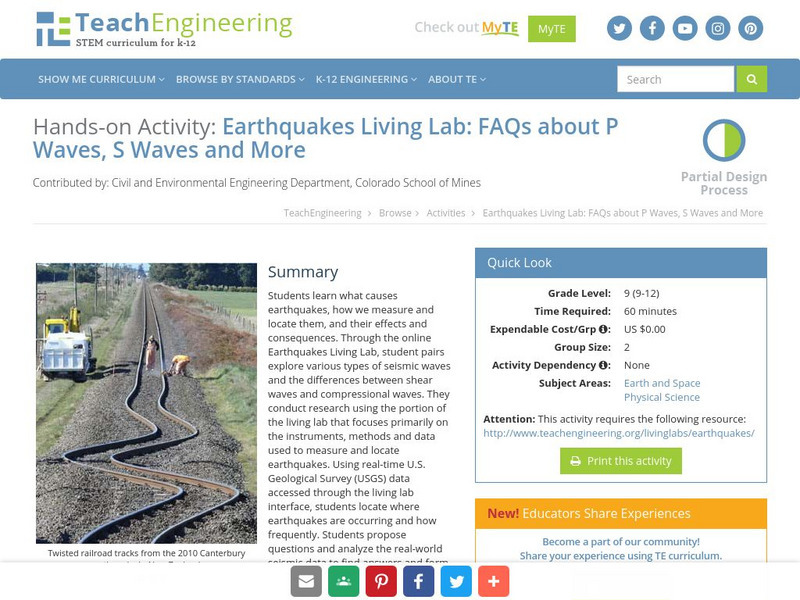Curated OER
Earthquakes!
Students experiment with the concept of earthquakes while completing a lab with marshmallows, toothpicks, modeling clay and firm Jell-O and rectangular pan. They explore what kind of soil earthquakes do the most damage in and how...
Curated OER
Hazards: Third Grade Lesson Plans and Activities
Learners discover hazards related to volcanoes and predict the effects these hazards have on people and land. As blossoming geologists explore various volcanic eruptions, including the hazards associated with them, they...
Curated OER
Earthquake Machine
Students explore plate tectonics by conducting a class experiment. In this earthquake lesson, students utilize scrap wood, sandpaper, rubber bands and a sanding belt to create a model earthquake experiment which shakes a nearby building....
Curated OER
Volcanoes!
Students study the Mount St. Helens eruption and how it occurred. In this experimental lesson students complete a lab that shows the eruption of Mount St. Helens.
Curated OER
Geology Rocks
Middle schoolers discuss information relating to Illinois geology. They examine top mineral resources in Illinois to find detailed information about geodes and where they can be found. Students complete geode lab to explore external...
Curated OER
Electricity
The presentation begins with a circuit building activity and two data tables for young scientists to copy and complete. Full of clever animations, it will definitely spark student interest! However, the information is incoherent. You may...
Curated OER
The Dynamics of Plate Tectonics
Simple lab and modeling activities can help your students understand the movements of the Earth's crust.
Curated OER
Looking into Earth with GIS
Pupils work with data from a seismic wave model in a freely available GIS (geographic information system) program, ArcVoyager SE. Using a GIS, they examine maps and produce graphs to explore variations in seismic wave velocities at...
Curated OER
Pangaea Puzzle
Students explore plate tectonics and the formations of the Earth's surface and why maps are distorted. In this Earth's surface instructional activity students complete a lab and answer questions.
Curated OER
Watch Out for Landslides
Students conduct an experiment. In this landslides lesson, students learn about landslides and discuss how they could minimize the risk of landslides. Students complete an experiment to see if changing the slope of the land...
Curated OER
The Slope of Land in Your Community
Students participate in finding the slope of a sand pile and then other materials. In this geology lesson, students describe what happens to the piles of materials when they are poured through a funnel. Students measure the slope using a...
Curated OER
Build It With Lincoln Logs!
Students use primary sources to analyze advertisements, prices, and styles of Lincoln Logs from Carson Pirie Scott catalogs from 1952 to 1960. Students then compare modern-day toy to Lincoln Logs of the 1950s by analyzing differences in...
Science 4 Inquiry
Layers and Laws: The Law of Superposition and Index Fossils
What can layers of rock teach us about the climate? Young scientists solve a mystery about who stole a cookie by applying the law of superposition. Then, they apply the same concept to solve a more difficult mystery, trying to determine...
Curated OER
Forces, Loads, Materials, Shapes
Students investigate forces, loads, materials and shapes as they relate to science. In this science lesson, students differentiate between the basic definitions required to perform a scientific experiment. They answer questions dealing...
Curated OER
Paper Bridge
Young scholars view a video about bridges. They create their own bridge out of paper and share it with the class. They create an advertisement for a bridge shown in the film.
Curated OER
Help! I'm Under Too Much Pressure!
Students play with a ping pong ball sized piece of modeling clay observing what happens to the clay as they play with it and write their observations in their notebooks. They share the results of their observations introducing the term...
Science Education Resource Center at Carleton College
Serc: An Earthquake Lab for Physical Geology
This article from the Journal of Geological Education describes an activity in which students locate the epicenter of several earthquakes, plot the trends of the two faults involved, and determine the sense of motion along the plane of...
TeachEngineering
Teach Engineering: Earthquakes Living Lab: Geology and Earthquakes in Japan
Using the online resources provided through the Earthquakes Living Lab, students investigate reasons why large earthquakes occur in Japan, drawing conclusions from tectonic plate structures and the locations of fault lines.
TeachEngineering
Teach Engineering: Earthquakes Living Lab: Locating Earthquakes
Students use U.S. Geological Survey real-time, real-world, seismic data from around the planet to identify where earthquakes occur and look for trends in earthquake activity.
Concord Consortium
Concord Consortium: Stem Resources: Buildings and Earthquakes
Do you think you can build a house that can withstand the shaking from an earthquake? In this activity, students design and construct model building that will be tested on a shake table with a force sensor. Activity includes questions...
TeachEngineering
Teach Engineering: Earthquakes Living Lab: P Waves, S Waves and More
Students learn what causes earthquakes, how we measure and locate them, and their effects and consequences.
TeachEngineering
Teach Engineering: Earthquakes Living Lab: The 1906 San Francisco Earthquake
Students examine the effects of geology on earthquake magnitudes and how engineers anticipate and prepare for these effects. They look in-depth at the historical 1906 San Francisco earthquake and compare it to the Kobe, Japan earthquake,...
TeachEngineering
Teach Engineering: Earthquakes Living Lab: Epicenters and Magnitudes
Students learn how engineers characterize earthquakes through seismic data. Acting as engineers, they use real-world seismograph data to locate earthquake epicenters via triangulation and determine earthquake magnitudes.
TeachEngineering
Teach Engineering: Earthquakes Living Lab: Designing for Disaster
Students learn about factors that engineers take into consideration when designing buildings for earthquake-prone regions.







